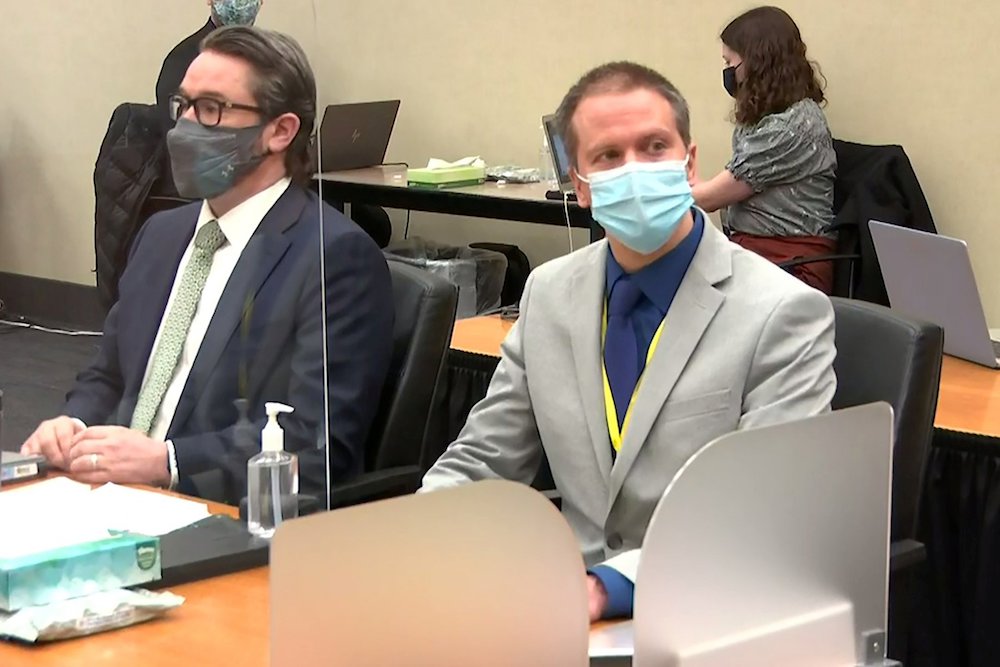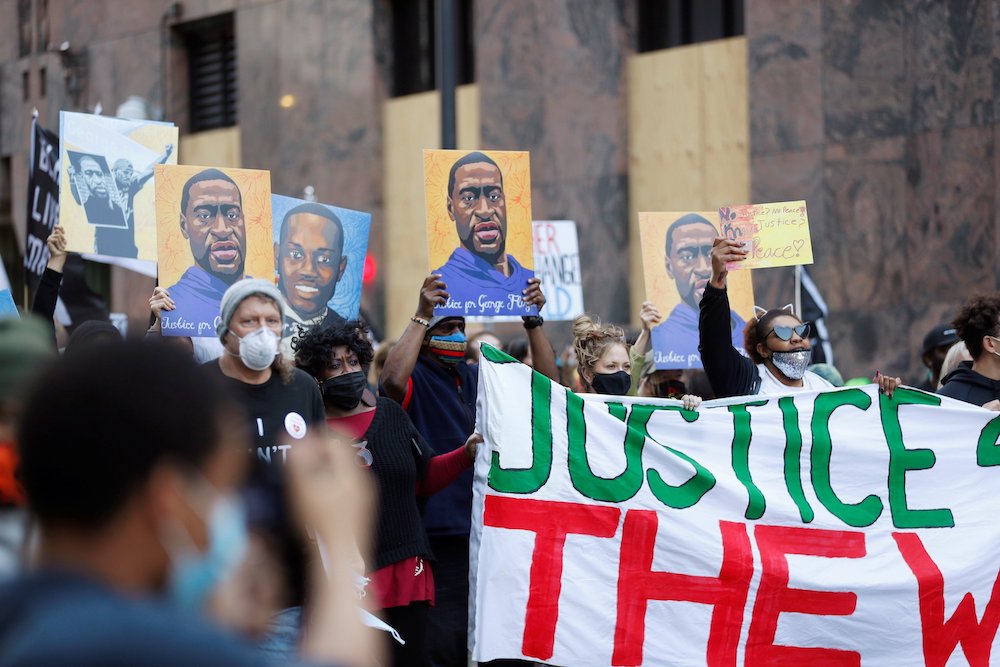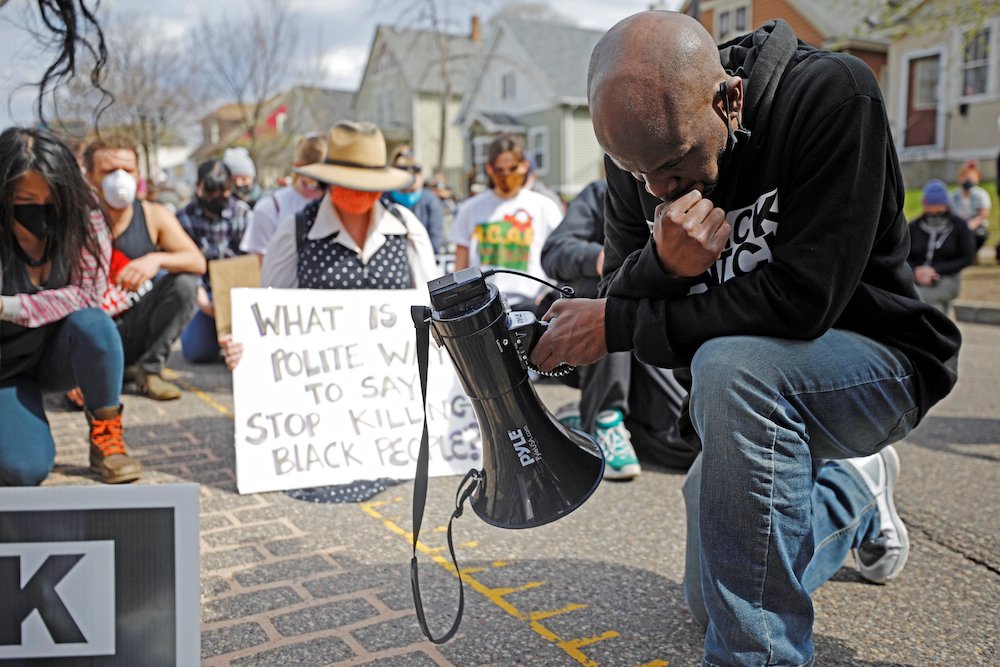
Former Minneapolis police officer Derek Chauvin and his defense attorney Eric Nelson attend closing arguments April 19, in Chauvin's trial in Minneapolis, where he was charged and found guilty with second-degree murder, third-degree murder and second-degree manslaughter in the death of George Floyd. (CNS/Pool via Reuters)
Editor's note: This story has been updated to include reaction from the U.S. bishops' conference.
Following the conviction of former Minneapolis police officer Derek Chauvin, who on April 20 was found guilty of murder and manslaughter in the death of George Floyd, Black Catholic leaders say it's a "small start" in both the country and the church's long overdue efforts for racial justice.
"It's a small start," said Ralph McCloud, the director of the U.S. bishops' domestic anti-poverty program, Catholic Campaign for Human Development. "But I can't help but think what it took for us to get here."
"Millions of people had to see the video of Floyd's killing and then take to the streets in protest for many Americans to see how the systems are skewed against people of color," McCloud told NCR. "So many other trials that are looming and so many other trials that have passed didn't have the luxury of this kind of exposure."
For three weeks, jury members heard gripping testimony from 45 witnesses, punctuated by devastating video footage of Floyd dying from cardiopulmonary arrest as Chauvin's knee rested on his neck.
The viral video is estimated to have been viewed more than 1 billion times following Floyd's killing on May 25, 2020. In the weeks that followed, protests and social unrest rippled across the globe, sparking an ongoing nationwide debate on policing and greater attention to America's unfinished work of guaranteeing civil rights for Black Americans.
After just over 10 hours of deliberation — and 330 days after Floyd was killed — a jury of five women and seven men returned to a Minnesota courtroom and handed down guilty verdicts of second-degree murder, third-degree murder and second-degree manslaughter.
"Catholics hold high the dignity of life," said McCloud, who observed that the video of Floyd's killing showed life being disposed of at the hands of the state likely due to his race.
He said he hopes the national attention of the trial causes a reckoning within "Catholic parishes, diocesean offices, chanceries and across the board.
"If we're quiet, we're complicit," he said, adding that Catholic institutions need to ask themselves what "makes people disregard and disrespect human life because of their race?"

Demonstrators in Minneapolis march on the first day of the trial of former police officer Derek Chauvin March 29. (CNS/Reuters/Octavio Jones)
Villanova University historian Shannen Dee Williams concurred with McCloud, saying that while Catholics must first "continue to pray for the soul of George Floyd, his family and all victims of state violence," she said "it would also be wonderful if all Catholics committed to becoming anti-racists and doing the hard work to actualize true racial justice, reparation."
"There was never a possibility of justice in this case, only accountability," said Williams. "If we lived in a truly just society, we would not have been worried about the verdict in a trial of a man who murdered another human being on video camera."
Vincent Lloyd, director of the Africana Studies program at Villanova University and an expert in Christian ethics, told NCR that as a Black man who grew up in Minnesota, he wasn't optimistic about what the jury would find, but he believes the verdict could hint at shifting public perspectives on police violence in the country.
"This is an exceptional case, rather than an ordinary case," Lloyd continued. "Many, many, many cases don't even go to trial, don't receive media attention, that are happening every day, where Black Americans are being treated wrongly — and at times violently — by the police. So there's a lot more work to do."
Lloyd said that among the reforms he would like to see is "making it so that prison is not the natural and seemingly necessary result of convictions, whether the person is convicted is Black or white or a police officer or not. We should be able to imagine beyond the prison in our criminal justice system."
He said the Catholic tradition offers a number of ways to help improve national thinking around community building over punishment, including "thinking about ways that we can be safe, ways that we can address harm, that restore communities and heal communities and move toward right relationship with each other — that are responsive to divine mandates of justice, rather than to what a police officer says is wrong."

Demonstrators in St. Paul, Minnesota, kneel for a moment of silence April 18, after learning of another police-involved shooting elsewhere in the U.S. The march was held the weekend before closing arguments in the Derek Chauvin trial and as protests continued demanding justice for Daunte Wright. (CNS/Reuters/Nick Pfosi)
Following the verdict, the U.S. bishops' conference said "the death of George Floyd highlighted and amplified the deep need to see the sacredness in all people, but especially those who have been historically oppressed. Whatever the stage of human life, it not only matters, it is sacred.
"As we have seen so plainly this past year, social injustices still exist in our country, and the nation remains deeply divided on how to right those wrong," the statement continued. "As a diverse community, the Catholic Church is committed to changing hearts and minds and to moving the conversation about race in this country beyond accusations and recriminations toward practical, nonviolent solutions to the everyday problems that are encountered in these communities."
A number of Catholic leaders and commentators also took to social media to offer their reactions.
Catholic theologian María Teresa (MT) Dávila took to Twitter noting that just because there has been some accountability in holding Chauvin accountable for Floyd's death, many other Black individuals, such as Tamir Rice and Breonna Taylor, who died at the hands of the police, have yet to experience a similar outcome.
"May this small act of justice keep our Black and Brown children, our uncles, our sisters, our neighbors, our mentors safer from police violence," she wrote.
"Justice may have happened today, but how many times has it not happened for Black people killed for going to get skittles, playing with a toy gun, holding a damn sandwich, or being stopped by police?" wrote University of Pennsylvania theologian Anthea Butler.
Bishop John Stowe of Lexington, Kentucky, wrote that the verdict "respects both the rule of law and what the whole world watched on video. More importantly it affirms what has been shouted on our streets for nearly a year, George Floyd's life matters, Black lives matter."
As the trial took place over the last month, the eyes of the country were on Minnesota awaiting the jury's conclusion, including the nation's most prominent Catholic, U.S. President Joe Biden.
On April 20, as jurors began their second day of deliberations, White House Press Secretary Jen Psaki said Biden spoke with the family of George Floyd "to check in with them and also share that the family was in his prayers."
Last June, Biden recorded a video message for the funeral of Floyd, wherein he invoked his Catholic faith.
"I grew up with Catholic social doctrine, which taught me that faith without works is dead, and you will know us by what we do," he said in his June 9 eulogy, lamenting that there is still much work to be done "to ensure that all men and women are not only created equal, but are treated equally."
"I'm praying the verdict is the right verdict," Biden told reporters earlier in the day on Tuesday, adding "I think it's overwhelming, in my view."
Advertisement
Across the nation's capital, other religious leaders also weighed in on the pending verdict.
"As a country we are rent with acrimony," prayed Margaret Grun Kibben, the chaplain of the United States House of Representatives, as Congress began its work on April 20. "Call us to lay all of this, as hopeless as it appears, on your judgment seat."
Even Pope Francis twice weighed in on Floyd's killing, saying last May that he was praying for the repose of Floyd's soul, and for "all those others who have lost their lives as a result of the sin of racism." In a follow-up interview, he praised the "many people who otherwise did not know each other took to the streets to protest, united by a healthy indignation."
As for what comes next for Catholics in this country and elsewhere, that verdict is yet to come.
"It is also important to remember that this saga is not over," said Villanova's Williams. "The presiding judge will sentence Chauvin in eight weeks. We must continue to pray that our legal system will hold Chauvin fully accountable for murdering another human being."
"We must also continue to work to reform, and if necessary dismantle the systems of power that produce the racial inequities and inequalities that we see and experience in policing, health care, education, housing, voting access and life outcomes," she added. "A more just and equitable society and world is possible. Until then, the fight continues."
Madeleine Davison contributed to this report.








